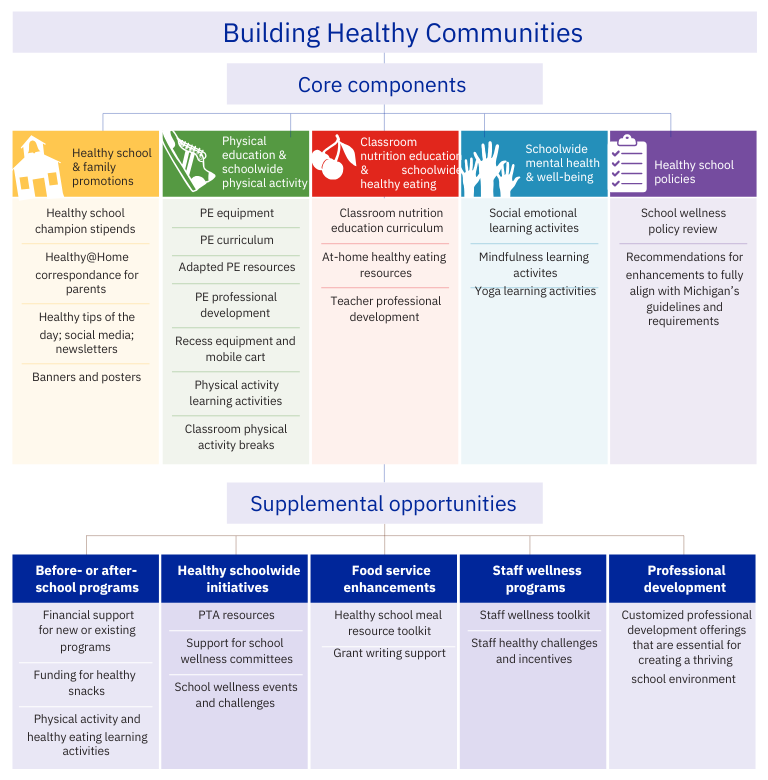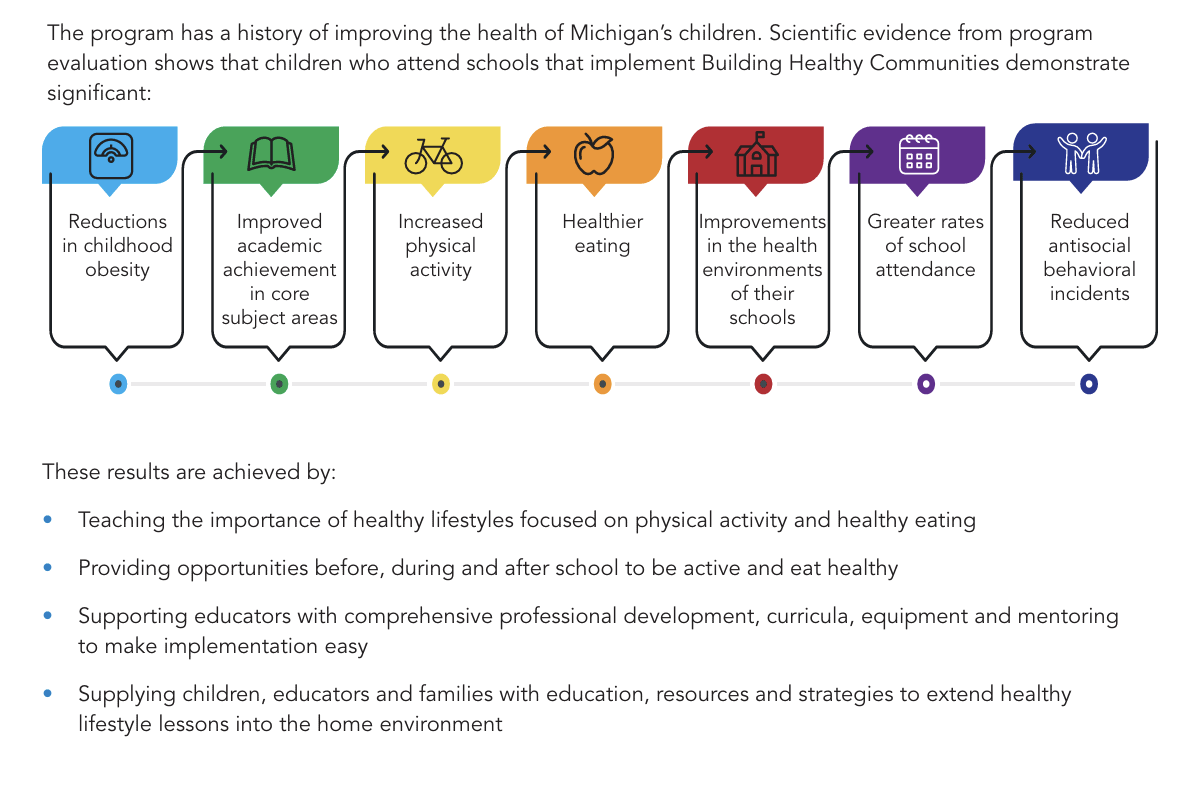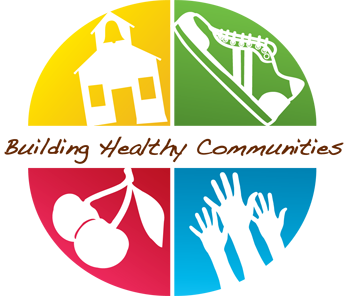About BHC
Building Healthy Communities (BHC) is an elementary school-based program designed to support healthier learning environments across Michigan. The program provides school districts with the tools and resources they need to promote student well-being, prevent chronic conditions, and support overall health.
District Engagement: Engaging school districts is a strategic approach that helps ensure long-lasting, coordinated improvements to the health environment in elementary buildings. Throughout the school year, our BHC staff works directly with elementary school leaders and collaborates with district administrators to assess current wellness practices, identify areas for growth, and implement plans that enhance school health efforts. Through this partnership, schools can create policies and environments that promote the overall well-being of students, staff, and families.
School Focus: While policy changes are guided at the district level, each elementary school receives targeted support to foster a healthier school culture. The BHC model includes five core components that are shown to strengthen school wellness efforts and provide students with meaningful opportunities to learn about and practice healthy habits. Recognizing that every school community is different, the program also offers a range of optional enhancements. These supplemental opportunities allow schools to tailor their approach and build on the core components in ways that best support their students and staff. Recognizing that every school community is different, the program also offers a range of optional enhancements. These supplemental opportunities allow schools to tailor their approach and build on the core components in ways that best support their students and staff.

Core Components
Healthy School and Family Promotion
Consistently promoting healthy living information, strategies and tips are essential for fostering healthy school and home environments. By reinforcing healthy messages at school and home, children receive consistent messaging and support to develop lifelong habits that benefit their health, school success, and overall well-being.
The program provides:
- Financial stipends for an on-site healthy school champion who serves as the school’s liaison with one of our program’s healthy school coordinators who is fully dedicated to facilitating the program’s success in each school’s unique context.
- Virtual program orientations tailored to each school stakeholder.
- An array of healthy school and lifestyle promotions-healthy tips of the day, newsletters, social media content, etc.
- In school signage, including program banners and posters.
- Healthy@Home correspondence for families that can be distributed in a variety of formats depending on how schools best communicate with their families.
- At-home healthy living tip sheets and activities to complement student’s learning experiences at school.
Physical Education and Schoolwide Physical Activity
Quality physical education is a key component of healthy schools and is guided by Michigan Department of Education and national education standards. PE teaches the knowledge, attitudes, and skills for students to be active for life.
The program provides:
- A large package of lifetime-guaranteed physical education equipment appropriate for students of all abilities.
- Comprehensive PE curriculum aligned with state and national standards
- Curricular resources to support adapted physical education for students with disabilities
- Virtual or on-site professional development trainings covering many topics related to quality physical education, active recess, and classroom physical activity
- A fully stocked mobile recess cart containing physical activity equipment and an activity deck to spark fun and inclusive games and activities
- Fun and easily accessible virtual physical activity breaks for use in classrooms and any other contexts throughout the school environment
Classroom Nutrition Education and Schoolwide Healthy Eating
A focus on healthy eating and nutrition education in elementary classrooms helps students build a
strong foundation for lifelong health and well-being. Also, when children are well-nourished, they have the energy, focus and mental clarity needed for optimal learning. The nutrition education is directly aligned with Michigan Department of Education and national nutrition education standards, as well as education for parents to integrate at home nutrition education that students learn at school.
The program provides:
- Comprehensive nutrition education lessons, aligned with state and national standards that are designed to be inclusive of all types of learners
- Healthy@Home virtual healthy living resources to share with parents and caregivers to
complement lessons learned at school - Resources and guidance to encourage healthier classroom and schoolwide policies,
snacks and parties - On-site or virtual professional development for educators on the benefits of nutrition
education and fostering healthy classroom and whole-school environments
Schoolwide Mental Health and Well Being
Children living in under-resourced communities disproportionately experience daily stressors that can influence their mental health and well being, socialization, with other children and adults, quality of life, and educational performance. Therefore, we provide a range of resources that support school personnel to recognize and address instances of trauma, facilitate positive social interactions, and help students manage stress and anxiety successfully.
The program provides:
- Social emotional learning activities that can be implemented in various contexts throughout school environments.
- Short, virtual professional development modules on trauma-sensitive school practices, and how to help all students succeed socially and emotionally.
- Mindfulness learning activities designed to help elementary students develop self confidence, self-awareness and self regulation skills.
- Classroom Yoga Ed videos and resources for integrating calming yoga activities.
- Resources for integrating restorative educational practices.
- In-person or virtual professional development on social-emotional learning, mindfulness, or yoga instruction.
Healthy School Policies
The Michigan State Board of Education recognizes and acknowledges that “schools cannot achieve their primary mission of education if students and staff are not physically, mentally and socially healthy.” Building Healthy Communities fully aligns with the Michigan Department of Education Model Local School Wellness Policy.
The program provides:
- Support from our healthy school coordinators to work with schools to locate the most recent versions of their local school wellness policies and determine when they were last reviewed or revised.
- Using the State of Michigan’s Healthy School Action Tool as a guide, our coordinators work with school stakeholders to review their existing local school wellness policies and determine the degree to which they align with the Michigan Department of Education’s guidelines and requirements, support Michigan School Meals, and facilitate policies that effectively promote students health, well-being and optimal learning.
- Based on the local school wellness policy reviews, our coordinators offer schools recommendations for enhancements to better align the Michigan Department of Education’s guidelines and requirements, Michigan School Meals, and facilitate healthier and higher achieving learners.
Optional Supplemental Opportunities
Food Service Enhancements
Increasing the food quality, school meal participation and efficient delivery of school meals is critical to supporting children’s health, especially in under-resourced communities with increased food insecurity.
- Healthy school meal resource toolkit with strategies for optimizing food service systems and healthy food promotions
- Support with grant applications to provide equipment and resources as enhancements to the school food system
Before or After School Programs
Before- and after-school opportunities for physical activity and nutrition education give students even further
opportunities to practice making healthy choices, which is especially important in under-resourced communities
that often lack opportunities outside school. By working with after-school programs (for example, childcare
programs), existing clubs or program, or establishing new before- or after-school opportunities, the program
provides an array of resources and supports to promote physical activity and healthy eating during out-of-school
time, including:
- Access to a clearinghouse of fun walking activities, fun and inclusive games and nutrition education activities
- Financial resources to support existing before- or after-school programs to enhance the activities they are able
to offer students including creating a new stand-alone club if other opportunities are not available - Funding to provide healthy snacks during before- and after-school programs
- Funding to support a mileage club or special interest physical activity program (for example, Girls on the Run)
Schoolwide Health Initiatives
Schoolwide health initiatives are excellent ways to meet the needs of students and families, and play an important role in creating a supportive and healthy environment. The program provides support for schoolwide wellness events and challenges that encourage collective action toward healthy environments, including:
- Support the PTA/PTO initiatives, such as family health fairs or family yoga nights
- Support in forming and maintaining school wellness committees.
- Funding for wellness events and schoolwide challenges to help build a culture of health that extends beyond classrooms. These initiatives foster collaboration among families, staff and community, encouraging lasting engagement and collective action toward health.
Launch and Enhance a Staff Wellness Programs
In schools, staff wellness is often overlooked and not always viewed as essential to a school’s overall health environment. Prioritizing staff wellness is crucial for promoting healthy, engaged teachers that set powerful examples for their students. The program offers funding and tools to help schools prioritize staff well-being by making it an integral part of their overall wellness culture, including:
- A robust staff wellness toolkit
- A menu of diverse staff wellness challenges and incentive structures
Customized Professional Development
Professional development for school staff on topics such as classroom physical activity, social emotional learning, mindfulness practices, nutrition education, trauma sensitive teaching, inclusive education and self-care are essential for creating a thriving school environment. Highly educated and empowered teachers are better prepared to integrate health focused practices that embrace student learning and overall school school success. The program offers a tailored menu of professional development options-offered virtually or on site-that can help equip educators with the knowledge and strategies to support student’s physical, emotional, and academic well-being while fostering their own resilience and effectiveness.
Our Impact

